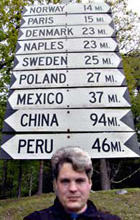Subscribe to the blog 
|
 |
 |
 |
 |
 |
Find a Flight Consider a Consolidator Rent a Car Pick a Railpass Book a Vacation Reserve a Room Get Gear |
|
||||||
|
The Melandris and the Mud Angels (cont'd) << back When the flood first started around 7:30 a.m. and water began swirling up the street around his feet, young Massimo was sent up the block to his grandmother's house to take her some bread, meat, and eggs. She asked why the provisions? and what was the matter?, and Massimo replied "Beh', c'e qualcosa che non va con l'Arno, ma non si preoccupi." (That would translate as the wonderful understatement 'there's a little something wrong with the Arno, but don't worry about it'). On his way back home, minutes later, the water was already surging strongly above his waist. His family gathered on the first floor (second story) originally, in the apartment now owned by Massimo (and where we were dining). Out the window they noticed a stunned local veteran, who had lost both legs in WWII and now had two false ones, standing on in the middle of the road, watching the waters rise around him. They called out to him, but he was in a state of shock and just stood there in the rising flood. Since the front doors on all the buildings had already waterlogged to such a degree they had swelled shut, people lowered a rope and hauled the old veteran inside, at which point the entire population of the building removed itself to Massimo's mother's place on the fourth floor to escape the waters that were already rising up into the second story (they'd eventually reach about four feet up the walls of the second floor). The building's inhabitants continued to live together up there for a week or two, the metal hinges on the veteran's false legs rusting up quickly and causing him to go "squeak, screech" continuously as he moved about. Luckily, it continued to rain — they say 'luckily' because, with their supply of fresh water cut off (water, water everywhere and not a drop...), their only recourse was to put pans on the roofs and collect rain water. The flooded part of the city, still encumbered by more than 12 feet of mud even after the waters receded, was sectioned off by the military, who set up blockades enforced by loops of razor barbed wire to keep out looters. Of course, life had to go on outside the flooded area, and Massimo said it was eerie, especially at night, to move from the "normal" part of the city on the periphery past those guards (identification papers, please) back into the center, where everything was dark for lack of electricity and every surface was inky black. Everyone used oil heat back then, and one of the first things the flood waters did was enter basements, fill the small private oil tanks, and float off the entire supply, creating a thick film of fossil fuel that rode on top of the flood waters. When the water started running back toward the Arno and its levels in town fell, the oil slick was deposited, inch by inch, as a solid sheet of grimy midnight on all the walls to a height of about three meters. The shops were empty. What hadn't been carried off by the torrents was left useless anyway, and one of the first orders of business for stricken owners was to shovel the ruinous remains of their stock into the street in growing rubbish heaps. The military drove around day and night delivering fresh water and bread rations to the houses and apartments in the flood zone. Massimo's mother turned to me at that point and for the first time put into heartfelt words what I had before only read about. The most incredible part of the whole flood, to her, was all these young students who came from all over — from France, and Switzerland, and Germany and other places — to help. They dug in the mud for hours on end to help locals reclaim their homes and historians liberate and save materials and art from the Uffizi, and from the thoroughly inundated state library down by the river. "They worked like demons all day," she said. "Quietly and seriously, then trooped up to sleep in unused train cars up at the station, still in clad their mud-caked and sweat-soaked clothes, only to came back early the next morning and start digging again." Looking out at these hardworking "Angeli del Fango," these Mud Angels, Massimo's mother felt a gratitude and a tenderness she's never experienced before or since. "They didn't ask for anything," she said with long-harbored respect. "Not at the time or afterward, they just did what they did to help the city, to help the people, to save Florence." Copyright © 1999 by Reid Bramblett. All rights reserved. |

